Lessons learnt from West Yorkshire
- 11 May 2010
NHS Direct has published its lessons learned from the start-up of the West Yorkshire Urgent Care Service, the out-of-hours service that was the subject of a highly critical report earlier this year.
NHS Direct chief executive Nick Chapman told the helpline’s April board meeting that it planned to adopt 45 recommendations as a result of the lessons learned from the bidding process and early implementation in West Yorkshire.
In a report to the board, Chapman said the trust had been selected to run the first major ‘single point of access’ service in England, covering 2.2m patients in West Yorkshire and launching in April 2009.
However, it had faced “major issues” with the implementation of a new computer system to run GP assessment, the face to face end of the service, and the transfer of large numbers of staff from one provider to NHS Direct.
West Yorkshire Urgent Care Service is run by NHS Direct together with private firm Care UK and not-for-profit group Local Care Direct.
Calls are initially taken by NHS Direct using its Clinical Assessment System and then triaged either by nurses using the CAS system or passed for doctor triage using TPP’s SystmOne.
The report said the first few months “were characterised by operational and clinical issues.” NHS Direct failed to meet many of its key performance indicators until the end of July 2009. Since then it has “largely achieved satisfactory levels of performance.”
The report adds: “However, painstaking work was required to ensure that the network of organisations involved worked effectively together to identify problems and issues, to agree solutions and implement these in a coordinated manner.
“It also became apparent that the cost of the new service was greater than the estimates that had been used during the bidding process.”
Changes to be implemented by NHS Direct include setting up a centrally managed function to oversee all significant bids for new services, management of each significant project under a programme board, tightly managed mobilisation and implementation activity, and tightly managed production of estimates and financial projections.
An investigation into West Yorkshire Urgent Care’s use of TPP’s out-of-hours system, carried out by Dr David Carson, author of the 2000 report on reforming emergency services, claimed that the system “created a significant risk to patient health”.
However, the five PCTs that commissioned the report subsequently said it had not enjoyed consensus. TPP said the problems identified were either misunderstandings of how its SystmOne software worked or were not software issues.
However, all parties signed up to an action plan as a result of the report. Papers presented to board meetings in three of the West Yorkshire PCTs in March, including NHS Leeds, state that many of the actions were complete and others had an imminent date of completion.





